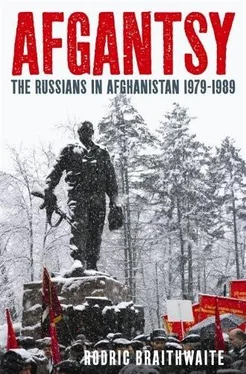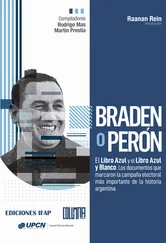As for the Afghans’ demand for Soviet troops, the more the Soviet leaders thought about it, the less they liked it. No one had entirely ruled it out. But when they put the arguments to Brezhnev, he made it clear that he was opposed to intervention, remarking sourly that the Afghan army was falling to bits and that the Afghans expected the Soviets to fight their war for them. You
And so the final conclusion was that the Soviet Union should send military supplies and some small units to ‘assist the Afghan army to overcome its difficulties’. Five hundred specialists from the Ministry of Defence and the KGB would reinforce the five hundred and fifty who were already in Afghanistan. The Russians would supply 100,000 tons of grain, increase the price paid for Afghan gas, and waive interest payments on existing loans. They would protest to the Pakistani government about its interference in Afghanistan’s internal affairs. Two divisions should go down to the border. But no Soviet troops should be sent to Afghanistan itself. 17
The next day Kosygin rang Taraki to tell him of the Politburo’s conclusions. By now the initial complacency of the Afghan leaders had given way to panic. Five thousand men of the Herat garrison, said Taraki, had gone over to the rebels with their weapons, ammunition, and supplies. The government forces now numbered only five hundred men, who were defending themselves at Herat airfield. If Soviet troops and weapons were not forthcoming, Herat would fall within twenty-four hours, and the rebels would march on Kandahar and on Kabul itself.
Naively arguing from Marxist first principles, Kosygin suggested that the government should arm the workers, the petty bourgeoisie, and the white-collar workers in Herat. They should emulate the Iranians, who had thrown out the Americans with no outside help. Could the Afghan government not raise, say, fifty thousand students, peasants, and workers in Kabul, and arm them with additional weapons supplied by Moscow?
Taraki pointed out drily that there were very few workers even in Kabul. The rest were under the influence of Islamic propaganda, which denounced the government as heathen. The Afghan army simply did not have enough trained crews to man more tanks and aircraft, even if the Soviets supplied them. He suggested that the Soviets place Afghan markings on their own tanks and aircraft, man them with Central Asian soldiers who could speak Afghan languages, airlift them to Kabul, and advance from there on Herat. Kosygin said the subterfuge would become known immediately; the Politburo would have to discuss all this. Taraki responded that, while the Politburo talked, Herat would fall.
Taraki was summoned to Moscow for talks and arrived on Monday 20 March. That morning Afghan government forces recaptured Herat, so the immediate pressure was off. His first meeting was with Kosygin, Ustinov, Gromyko, and Ponomarev, the long-standing head of the International Department of the Central Committee. Kosygin emphasised the deep, continuing, and unconditional nature of the relationship between the Soviet Union and Afghanistan. But the Afghan government should not give the impression that it could only solve its problems by calling in Soviet troops. That would undermine its authority in the eyes of the people, spoil relations between Afghanistan and neighbouring countries, and injure the country’s international prestige. If Soviet soldiers came to Afghanistan, they would find themselves fighting Afghans, and the Afghan people would never forgive them. The Vietnamese had defended their country against the Americans and the Chinese without relying on foreign soldiers; Afghanistan could do the same. The Russians would help by providing military supplies and massive political support against the country’s foreign enemies: Pakistan, Iran, China, and the United States.
Taraki agreed that politics were key. He claimed—against the evidence—that the mass of the people supported the government and its reforms. But this had incensed the reactionaries in Iran and Pakistan, who had accused the Kabul government of betraying Islam, and had stirred up a campaign of subversion against it.
What the Afghan army needed urgently, said Taraki, was armoured helicopters, armoured vehicles, communications equipment, and the people to operate and maintain them. Ustinov replied that the Russians would supply twelve helicopters. But they would not supply pilots and crews. Kosygin pointed out that the Vietnamese had managed to operate the equipment they received on their own. Unfortunately, countered Taraki, many of the Soviet-trained officers were politically unreliable: ‘Muslim brothers’ or Chinese sympathisers.
That, said Kosygin, was something Taraki would have to sort out for himself. He gave Taraki a word of friendly advice: the Afghan government should broaden its political base. In a coded reference to the massive shootings and torture which had so exercised the Politburo, he added, ‘In Stalin’s time, many of our officers were put in jail. And when the war broke out, Stalin was forced to send them to the front. These people showed themselves to be true heroes. Many of them rose to high rank. We are not interfering in your internal affairs, but we want to express our opinion regarding the necessity of behaving solicitously toward cadres.’
Taraki did not pick up this point, but concluded sourly that it looked as if the Russians would give his government every assistance, short of a guarantee against aggression. If an armed invasion of Afghanistan took place, Kosygin countered, a completely different situation would arise. He then hurried Taraki off to his meeting with Brezhnev. 18
Brezhnev described that meeting to his colleagues two days later. Taraki had arrived in Moscow ‘in a somewhat excited condition, but during the discussion he gradually cheered up and towards the end he behaved calmly and sensibly’. Brezhnev had told him firmly that the government must broaden its political base and stop shooting people. He had emphasised yet again that in the present circumstances the Soviets would send no troops. So far, the Politburo agreed, so good. 19
On 1 April Gromyko, Andropov, Ustinov and Ponomarev submitted a policy document. For the most part it simply summarised the arguments and conclusions which had already been adopted. Although it was overlaid with a heavy dose of orthodox Marxist jargon, the analysis was sober and realistic enough. The problem, it said, was primarily political. Afghanistan had not been ripe for a full-blown socialist revolution in the first place. The leaders of the new regime were not up to their tasks. They were inexperienced and prone to excess. They were bloodily divided among themselves; they had alienated the Islamic clergy, the party, the army, and the administration by their ruthless repression of real and imagined dissent; and they had pressed ahead too fast with half-baked socialist reforms which had backfired among the very people they were supposed to benefit. They should now broaden their political base: they should allow religious freedom except to those who worked against the government; they should observe the rule of law even when suppressing subversion; they should draw up a constitution to strengthen democratic rights and regulate the activities of the state organs. These thoughts remained a consistent part of Soviet policy. Gorbachev picked them up in 1985, and the last Communist leader of Afghanistan, Najibullah (1947–96), tried to implement them with the Policy of National Reconciliation which he launched in January 1987. By then it was too late.
The paper recommended that the Soviets should continue to supply military weapons and equipment, and train the Afghan army and security organs to use them properly. They should help the Afghans to develop a viable economy. But the government should remain firm in its refusal to send Soviet military units to Afghanistan—even if there were further unrest in Afghanistan, which could not be ruled out.
Читать дальше












